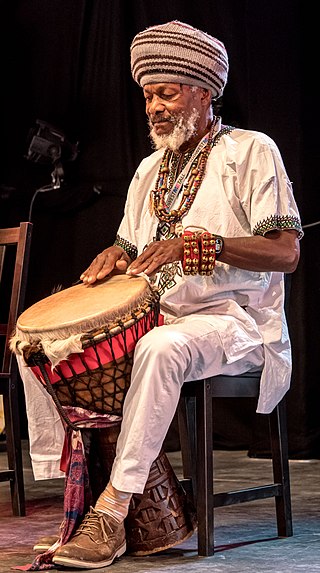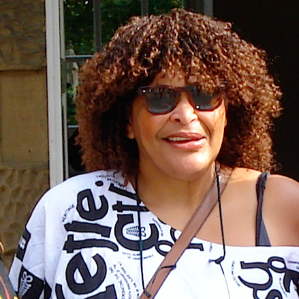Related Research Articles

This article is about the demography of the population of Trinidad and Tobago including population density, ethnicity, education level, health of the populace, economic status, religious affiliations and other aspects of the population.
Soca music is a genre of music defined by Ras Shorty I, its inventor, as the "Soul of Calypso", which has influences of African and East Indian rhythms. It was originally spelled "sokah" by its inventor but through an error in a local newspaper when reporting on the new music it was erroneously spelled "soca"; Lord Shorty confirmed the error but chose to leave it that way to avoid confusion. It is a genre of music that originated in Trinidad and Tobago in the early 1970s and developed into a range of styles during the 1980s and after. Soca was initially developed by Lord Shorty in an effort to revive traditional calypso, the popularity of which had been flagging amongst younger generations in Trinidad due to the rise in popularity of reggae from Jamaica and soul and funk from the United States. Soca is an offshoot of calypso/kaiso, with influences from East Indian rhythms and hooks.
The music of Trinidad and Tobago is best known for its calypso music, soca music, chutney music, and steelpan. Calypso's internationally noted performances in the 1950s from native artists such as Lord Melody, Lord Kitchener and Mighty Sparrow. The art form was most popularised at that time by Harry Belafonte. Along with folk songs and African- and Indian-based classical forms, cross-cultural interactions have produced other indigenous forms of music including soca, rapso, parang, chutney, and other derivative and fusion styles. There are also local communities which practice and experiment with international classical and pop music, often fusing them with local steelpan instruments.
The music of Anguilla is part of the Lesser Antillean music area. The earliest people on the island were the Caribs and Arawaks, who arrived from South America. English settlers from St Kitts and Irish people colonized the island later. Unlike regional neighbors, however, the plantation system of agriculture which relied on chattel slavery never took root in Anguilla, causing a distinctly independent cultural makeup. The most recent influences on Anguilla's musical life come from elsewhere in the Caribbean, especially the music of Trinidad and Tobago and Jamaica, as well as abroad, especially the music of the United States and the United Kingdom. Anguilla's Rastafarian heritage has played a role in the island's music and culture and produced influential figures like activist Ijahnya Christian and Robert Athlyi Rogers, the author of The Holy Piby.

The music of Antigua and Barbuda is largely African in character, and has only felt a limited influence from European styles due to the population of Antigua and Barbuda descending mostly from West Africans who were made slaves by Europeans.
The culture of Trinidad and Tobago reflects the influence of Indian-South Asian, African, Indigenous, European, Chinese, North American, Latino, and Arab cultures. The histories of Trinidad and Tobago are different. There are differences in the cultural influences which have shaped each island. Trinidad and Tobago is an English-speaking country with strong links to the United Kingdom.
The Spiritual Baptist faith is a religion created by persons of African ancestry in the plantations they came to in the former British West Indies countries predominantly in the islands of a Grenada, Saint Vincent and the Grenadines, Tobago and the Virgin Islands. It is syncretic Afro-Caribbean religion that combines elements of the many varied traditional African religions brought by the enslaved populations combined with Christianity. Spiritual Baptists consider themselves to be Christians.
Ralph Maraj is a Trinidad and Tobago politician, actor, playwright, and teacher. He served as Minister of Foreign Affairs under a People's National Movement (PNM) administration, Minister of Communication and Information Technology under a United National Congress (UNC) administration, and was a founding member of National Team Unity before returning to the PNM to work as a speech writer for Prime Minister Patrick Manning. Prior to entering politics in 1991, Maraj worked as a teacher at Naparima College in San Fernando. He also attended that school. He wrote several plays, the most successful being Cynthia Sweetness. Maraj also starred in the movies The Right and the Wrong (1970) and Bim (1974), described by Bruce Paddington as "one of the most important films to be produced in Trinidad and Tobago".
Earl Wilbert Lovelace is a Trinidadian novelist, journalist, playwright, and short story writer. He is particularly recognized for his descriptive, dramatic fiction on Trinidadian culture: "Using Trinidadian dialect patterns and standard English, he probes the paradoxes often inherent in social change as well as the clash between rural and urban cultures." As Bernardine Evaristo notes, "Lovelace is unusual among celebrated Caribbean writers in that he has always lived in Trinidad. Most writers leave to find support for their literary endeavours elsewhere and this, arguably, shapes the literature, especially after long periods of exile. But Lovelace's fiction is deeply embedded in Trinidadian society and is written from the perspective of one whose ties to his homeland have never been broken."

Destra Garcia is a Trinidadian musician, singer and songwriter of soca music. She is also known by the mononym Destra. She is one of the most popular female soca artists in the world.
Lawrence Scott FRSL is a novelist and short-story writer from Trinidad and Tobago, who divides his time between London and Port of Spain. He has also worked as a teacher of English and Drama at schools in London and in Trinidad. Scott's novels have been awarded (1998) and shortlisted for the Commonwealth Writers' Prize and thrice nominated for the International Dublin Literary Award. His stories have been much anthologised and he won the Tom-Gallon Short-Story Award in 1986.

Beryl Eugenia McBurnie OBE was a Trinidadian dancer. She established the Little Carib Theatre in Woodbrook, Port of Spain, and promoted the culture and arts of Trinidad and Tobago as her life's work. She helped to promote the cultural legitimacy of Trinidad and Tobago that would shift the country into the age independence. McBurnie dedicated her life to dance, becoming one of the greatest influences on modern Trinidadian pop culture.

Lisa Wickham is a media producer-director-TV personality in Trinidad and Tobago. She began her television career at the age of six on the weekly Rikki Tikki Children's Show, a live programme on the only national TV station in Trinidad and Tobago at the time, Trinidad and Tobago Television (TTT). She literally grew up on national television, eventually hosting shows such as the daily morning prime-time news and talk show T&T This Morning, the daily mid-morning talk show Community Dateline and the iconic teen talent show Party Time. In 2005, the government of Trinidad and Tobago closed TTT and in 2006 re-opened the station under the name Caribbean New Media Group (CNMG). CNMG was then closed in 2018.

Gerald Achee known by his stage name Gerry Drums, was a Trinidadian drummer and the leader of the Village Drums of Freedom.

Mark Antonio Jiminez, better known by his stage name Ataklan is a Trinidadian singer-songwriter and performer primarily of the modern rapso tradition. Ataklan has been referred to as "Trinidad's answer to Beck" and a "fiercely independent songwriter and singer and arguably the most original artist to have emerged on the island since David Rudder". Since his emergence in 1993, Ataklan has released tracks including "Flambo", "Naked Walk", "Flood on the Main Road", "Shadow in de Dark", "Soca Girl" and "Caribbean Swagga", among numerous others.

Geraldine Connor, PhD, MMus, LRSM, DipEd, was a British ethnomusicologist, theatre director, composer and performer, who spent significant periods of her life in Trinidad and Tobago, from where her parents had migrated to Britain in the 1940s. Her father was actor, singer and folklorist Edric Connor and her mother was theatrical agent and cultural activist Pearl Connor. Geraldine Connor is best known for having written, composed and directed Carnival Messiah, a spectacular work that "married the European classical tradition of oratorio with masquerade and musical inspiration from the African diaspora". For more than 20 years, she lived in Skelmanthorpe in Yorkshire, where she went in 1990 as a lecturer at the University of Leeds.
Mahmoud Pharouk Alladin (1919–1980) was a Trinidad and Tobago artist, poet, writer, teacher and public servant. Alladin played a major role in the expansion of art education and was an important influence on a wide range of Trinidad and Tobago artists. He helped develop a local artistic identity, and helped legitimise rural Indo-Trinidadian life as a subject for local artists.
Dominique Le Gendre is a music composer based in London, England. Le Gendre is a former associate of the Royal Opera House and received an opera commission. She has also provided music for the Shakespeare Globe Theatre, Talawa Theatre Company, and the Theatre of Black Women, among other places. She provided the music for an opera with words by Seamus Heaney.
The Right and the Wrong is a 1970 Trinidadian drama film directed by Harbance Kumar, in which Trinidadian slaves revolt against their cruel white master. Along with The Caribbean Fox, it was one of the first films natively produced not only in Trinidad and Tobago, but also the English-speaking West Indies. Despite mediocre reception, it was a hit in its native country and was screened in several other Caribbean nations.
References
- 1 2 Bruce Paddington, "Andre Tanker: The Bob Dylan of Trinidad, whose music embraced many styles but kept a political edge", The Guardian, 12 March 2003.
- ↑ Georgia Popplewell, "André Tanker: Music Beyond Measure" (obituary) Archived 16 December 2004 at the Wayback Machine , Caribbean Beat , Issue 61, May/June 2003.